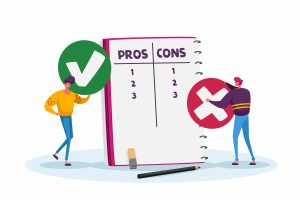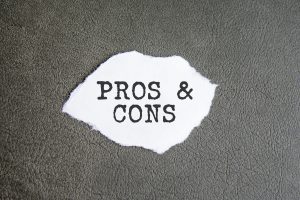
WordPress is the most popular and widely used content management system (CMS) for a reason. If you have never heard of WordPress, it's a system that allows you to manage content on a website. Without WordPress or any other CMS, you would not be able to easily add or change content on the website, but would have to hire a separate web designer for each change. Today you can find out what are the pros and cons of making a WordPress website.
For a content-rich website where you want to publish text or change information on a regular basis, the big problem is that you have to contact the web designer every time and wait for them to do it, which would only take a few seconds with a CMS.
The simplicity of the system
The user interface of WordPress is very simple and anyone who starts using it learns to work with it very quickly and without difficulty. Even if you are not technically savvy, managing a WordPress system is easy to master.
No need to change the code
Without a CMS, any changes to the web content would have to be incorporated into the website's code, which is obviously difficult for non-developers to do. With WordPress, you can very easily add and change content as you see fit. All content is arranged in pages or posts that you can easily edit and create. 
The blog is already embedded
If you want to write a business blog or post news on the web, WordPress makes it easy. The blog option is already integrated into the CMS, and all you have to do is start writing.
Easy to add new features
If you want to set up a newsletter signup on the web - no problem! In WordPress, this is quite easy to solve. Want social networking buttons or a banner in one place on the web? It can be done!
Google loves WordPress websites
WordPress is a well-structured and high-quality CMS, which is why Google loves it, and with a WordPress website you can easily position yourself well in a search engine (if the SEO part is done well).
WordPress also offers powerful plugins and integrations, thousands of themes to choose from, search engine optimization (SEO) benefits, responsiveness. It simplifies content creation and is updated frequently. We also love WordPress because it is very flexible and integrates well with third-party tools. It gives you low hosting requirements and a huge (and supportive) community.
In short, these are the main features offered by the WordPress system, but these features can be greatly expanded by adding various plugins.
Adding pages and blog articles
When you create a new page or post in WordPress, you simply paste text into the editor and style it as you wish with various options such as bold, italics, etc. In more advanced WordPress themes, like the ones we use, there is the option to add various elements like icons or galleries to the web pages, which greatly beautifies the website.
Manage comments
If you allow other people to post comments on your articles, WordPress lets you approve or disapprove comments and reply to comments.
Add a widget
You can change widgets (website plugins) that appear on the page in the sidebar (if you have one) or in the footer (at the bottom of the page). Widgets are add-ons like search tools, newsletter subscription fields, recent comments lists, and more.
Changing the menu
The menu at the top of the page, which allows for easy navigation of the site, can be easily changed through the WordPress interface. For example, if you add a new page to the web, you can add it to the menu with just a few clicks. 
Adding plugins
As we mentioned earlier, WordPress offers several website upgrades through plugins. There are currently 58.000+ WordPress plugins offered, and new and better ones are being added all the time. Many plugins are free, while some have paid premium versions.
Adding users
If there are multiple people in your organization who add or modify web content, you can create a separate account for each person to log in through.
Changing the design
WordPress is the part of the website that runs in the background and allows you to manage the content, but it is also used to design the site. Once you install the WordPress theme you want, i.e. design, you can customise it to your brand and preferences through WordPress. This part is a bit harder than the other WordPress features we mentioned and requires more experience and knowledge to make the page design turn out well in the end. This is why most businesses hire professionals to create a website for them that looks beautiful and professional.
WordPress.org is a free open source software that allows you to create websites. If you choose this option, you will first need to buy a domain and hosting, then install WP, and then edit the site (choose a theme, plugins, etc.). Here you have complete freedom to edit, many options available, but also responsibility! Make sure your site not only looks nice, but is secure, responsive, fast, functional and search engine optimized. If you have not encountered this software before, do not know anything about programming and do not have time to educate yourself in this area, get the help of experts!
Some of the situations where we would recommend WP.org: 
- if you plan to monetize your website;
- if you need advanced features and editing capabilities;
- if you want to set up a web store or membership site.
The WordPress.com platform is ideal for bloggers and anyone who wants to create a website themselves, for example for their business or hobby. With WordPress.com, you can focus on the content you create, while the most important technical things are done and solved by you. But that does not mean you can design the site with a few clicks, even though the platform itself is very easy and convenient to use once you master the basics.
If you choose this option, you'll need to create a WordPress.com account, choose a domain, a plan (free or paid) and a theme, and then you can start working. You do not have to worry about hosting, responsiveness, site security, etc. because WordPress.com takes care of that for you. It's up to you to design the site the way you want and fill it with great content!
Some of the situations where we would recommend WP.com:
- when you want to quickly create a blog or website on your own;
- when you want to focus on content creation and not get too involved with technical details;
- if you want to be part of the great WordPress.com blogging community.
Lest we just praise WordPress, it does of course have its weaknesses. Namely, the biggest drawback of WordPress and the main reason why it is not always used is that the requirements of some websites simply exceed the capabilities of WordPress. Complex websites require a variety of functionalities that WordPress cannot provide. In this case, a custom CMS is used, which means that your web agency programs the CMS itself. Of course, this takes longer and is more expensive, but it is also the best solution in such cases.
Some of the other challenges are:
WordPress is reliable, secure, relatively easy to use, SEO-adapted, with a large number of solutions for various web needs (e.g. like for security) and easily accessible customer support.
These are by far the biggest advantages, especially since it can be used by beginners and those who are more experienced do not have to call tech support for every little thing.
Some of the most common types of websites created with WP to get an idea of the possibilities it offers: 
1.Personal blog
2.Business website
3.Online business
4.Educational platform
5.Podcast site
6.Online portfolio
7.Online business/portal
8.Membership site
9.Event Management Page
Which version you ultimately choose depends on you, your skills, and your needs. In any case, the website is something you can no longer present yourself to the world without, and it is important that it is not only visually appealing, but also fully functional, fast and responsive. That's why we recommend WordPress!